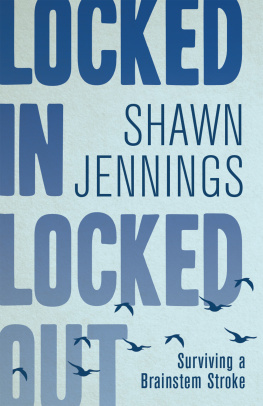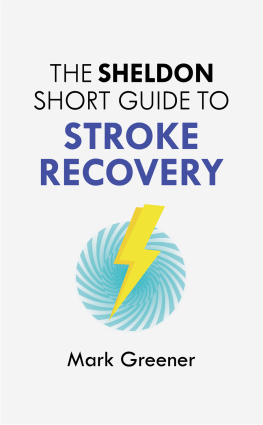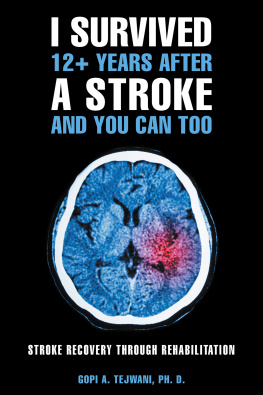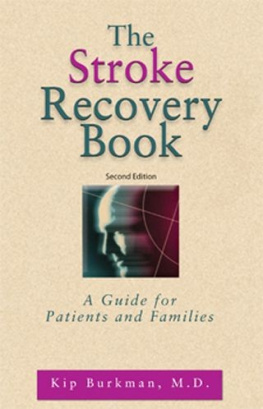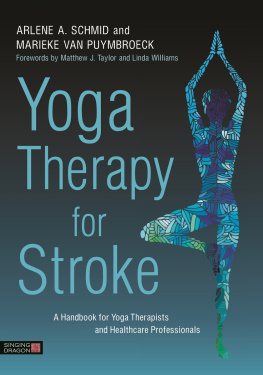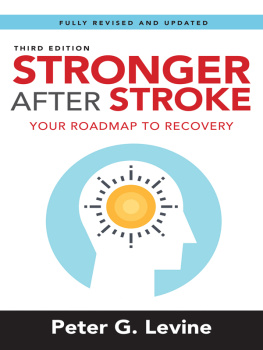When Your Spouse Has a Stroke
A Johns Hopkins Press Health Book
When Your Spouse Has a Stroke
Caring for Your Partner, Yourself,
and Your Relationship
Sara Palmer, Ph.D., and Jeffrey B. Palmer, M.D.

Note to the Reader. This book is not meant to substitute for medical care of people with stroke, and treatment should not be based solely on its contents. Instead, treatment must be developed in a dialogue between the individual and his or her physician. Our book has been written to help with that dialogue.
2011 Sara Palmer, Ph.D., and Jeffrey B. Palmer, M.D.
All rights reserved. Published 2011
Printed in the United States of America on acid-free paper
9 8 7 6 5 4 3 2 1
The Johns Hopkins University Press
2715 North Charles Street
Baltimore, Maryland 21218-4363
www.press.jhu.edu
Library of Congress Cataloging-in-Publication Data
Palmer, Sara.
When your spouse has a stroke : caring for your partner, yourself, and your relationship / Sara Palmer, and Jeffrey B. Palmer.
p. cm. (A Johns Hopkins Press health book)
Includes bibliographical references and index.
ISBN-13: 978-0-8018-9886-0 (hardcover : alk. paper)
ISBN-10: 0-8018-9886-2 (hardcover : alk. paper)
ISBN-13: 978-0-8018-9887-7 (pbk. : alk. paper)
ISBN-10: 0-8018-9887-0 (pbk. : alk. paper)
1. Cerebrovascular diseasePopular works. 2. Cerebrovascular diseasePatientsFamily relationshipsPopular works. 3. Cerebrovascular disease-PatientsRehabilitationPopular works. 4. CaregiversPopular works. I. Palmer, Jeffrey B. II. Title.
RC388.5.P34 2011
616.81dc22 2010025296
A catalog record for this book is available from the British Library.
Special discounts are available for bulk purchases of this book. For more information, please contact Special Sales at 410-516-6936 or specialsales@press.jhu.edu.
The Johns Hopkins University Press uses environmentally friendly book materials, including recycled text paper that is composed of at least 30 percent post-consumer waste, whenever possible. All of our book papers are acid-free, and our jackets and covers are printed on paper with recycled content.
For our parents,
Irving Sarnoff and Barbara and Walter Palmer
And in loving memory of
Suzanne Sarnoff
Contents
When Stroke Moves In
How Stroke Affects You and Your Marriage |
The Secret Ingredient
Stroke and Social Support |
You Are the One
Balancing the Roles of Caregiver
and Marriage Partner |
A Fine Romance
Sex and Intimacy after Stroke |
Give Me a Break
Support for the Caregiving Spouse |
In Sickness and in Health
Rebuilding Your Marriage after Stroke |
Til Death Do Us Part
Going the Distance with Your Spouse after Stroke |
From This Day On
The Future of Caregiving |
Index |
Acknowledgments
We are thankful to the many stroke survivors and their caregiver partners and spouses whom we have cared for over the years for allowing us to play a part in their physical and emotional recovery after stroke. Their struggles and triumphs were a major source of inspiration for this book.
Our work on caregiving was made possible by the generosity of many couples who volunteered to be interviewed about the effects of stroke on their marriage. They gave freely of their precious time and spoke openly about their experiences, good and bad. Their stories of problems and solutions, agreements and compromises, frustrations and satisfactions, sadness and humor, anger and love, fear and hope form the backbone of this book.
We appreciate the assistance of the speech language pathologists, social workers, and occupational therapists who invited us to share preliminary ideas for the book at stroke clubs and support groups, where we obtained indispensable feedback from stroke survivors and caregivers.
We thank our colleagues in the Johns Hopkins University Department of Physical Medicine and Rehabilitation, the Good Samaritan Hospital of Maryland, and the Johns Hopkins Bloomberg School of Public Health for enriching our knowledge and understanding of stroke and caregiving, for providing essential information on caregiver resources, and for their encouragement and interest in this book.
Jacqueline Wehmueller, our editor at the Johns Hopkins University Press, enriched the quality of the book with her invaluable insights and suggestions. Lois R. Crums copyediting improved the clarity of the final manuscript.
Finally, we could not have written this book without a steady supply of support from our families and many wonderful friends. We thank them all for their love and patience.
When Your Spouse Has a Stroke
PROLOGUE
Setting the Stage for Life after Stroke
Stroke Happens to Both of You
Stroke happenssuddenly, unpredictably, and more frequently than you might think. Every year in the United States alone, about 795,000 people have a stroke, and there are currently about 6 million stroke survivors living in this country. If you are reading this book, you are most likely the spouse of a stroke survivor; when stroke happened to your partner, it really happened to both of you. The stroke affects your life, immediately and over the long term, as well as your partners life. If your spouses stroke was recent, you know that a stroke can turn your own world upside down in an instant. And if youve had some time to adjust, you know that the effects of your spouses stroke on your emotional health and your relationship can be far-reaching.
When your spouse has a stroke, you feel its shock waves. Stroke is often terrifying, and you may feel unprepared to cope with its immediate effects or its long-term consequences. But despite your lack of experience or preparation, you are likely to be the first one called upon to respond, make decisions, and provide for your spouses care. You will probably assume the role of primary caregiver and begin a course of on-the-job training.
If you are like most couples, the stroke will significantly affect your marriage; and it will affect your own physical and emotional health as well as your spouses. Whether you are young or old, married for a few years or for decades, your spouses stroke can be the biggest challenge of your married life. Like many other loving and committed spouses, you will no doubt do your best to help your spouse recover, no matter what difficulties you encounter. Our goal is to make your job easier, by helping you to anticipate problems that you and your spouse may encounter in the course of recovery from stroke and by offering ideas and resources to help you find solutions.
How This Book Can Help
One of us (Sara) is a rehabilitation psychologist and the other (Jeffrey) is a physiatrist (a doctor specializing in physical medicine and rehabilitation). In our professional lives, we have cared for stroke survivors and their spouses for more than 25 years. During this time, changes in the health care delivery system have resulted in shorter stays for stroke survivors in both the acute hospital and the inpatient rehabilitation unit. The nursing staffs of many hospitals struggle to keep up with basic patient care, and social workers are often preoccupied with other tasks as they make arrangements for the persons care after leaving the hospital and communicate with insurance companies to ensure patient benefits. There is little opportunity to educate the spouse about her role as caregiver, or even to provide adequate information on what to expect in terms of recovery from the stroke. Spouses may arrive home without a clear sense of what to do and with little preparation for problems they will encounter as caregivers.
Next page

